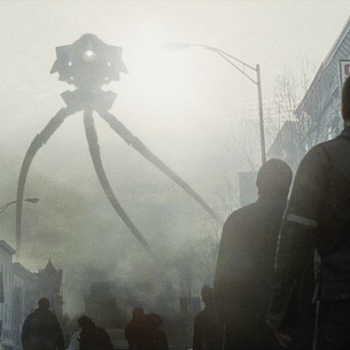Editors’ Note: This article is part of the Patheos Public Square. This month we’re asking: Has Hollywood Become Our National Conscience? Read other perspectives here.
Christian culture has long had a rocky relationship with cinema. Evangelical websites count swear words in lieu of discussing the actual film. Boycotts are organized against offensive movies. Some families require all art to come with the label “Christian” attached to guarantee that it’s safe. As a critic, I’ve received angry emails upon recommending an R-rated movie. Simply admitting that I saw “Brokeback Mountain” in 2005 caused some to question my salvation.
Not every Christian or every church engages in this overreaction, but enough do that it might be worthwhile to ask what it stems from. The answer — as it is to most overreactions — is fear. We’re afraid of the toxic effect these works could have on impressionable hearts, so we block them out of our homes, churches and lives.
Now certainly, movies can influence bad behavior. What kid hasn’t repeated a curse word from television or imitated their favorite fight scenes? I’m among the many who have walked out of a movie theater in shame after seeing something that turned out to be nothing more than gross titillation or a parade of disturbing images. Not everything is beneficial.
But the movies have also inspired people to do good. Parents still point to Gregory Peck’s portrayal of Atticus Finch to teach their children about decency. Kids have learned about everything from friendship to how their emotions work through animated films. Documentaries like “The Act of Killing” have spurred important social change. Films have opened our eyes to characters who do not look or live like us, taught us empathy, and caused us to examine our own attitudes. And that’s not always a G-rated affair.
Film can influence good and evil, but the art itself is not the cause. Rather, we must look at how — and whether —we choose to engage with it.
If I sit my 4-year-old son in front of Netflix and don’t watch or discuss it with him, I shouldn’t be surprised when he imitates bad behavior he sees. In the same way, if we are passive viewers who just let images wash over us without examination, we shouldn’t be surprised when we find that what we’re putting before our eyes adversely affects us.
Art is a great tool for spurring convictions, but it is never the final moral influence for Christians. Rather, we must watch with discerning eyes for whatever is true, noble, right, pure and lovely. Everything should pass through the prism of Scripture, and we should always be sensitive to the work of the Holy Spirit on our conscience. But that means so much more than just cringing at every F-bomb. We must learn how to watch movies better, with spiritual eyes.
Roger Ebert famously said, “It’s not what a movie is about; it’s how it’s about it.” That involves looking beyond content with an eye toward context. Does offensive language exist only for shock value, or is it a reflection of the world the characters live in? Does the film thrill to bloodshed, or does the violence mean more than just an adrenaline rush? Is its depiction of sex gratuitous, or is it saying something deeper about the characters? Understanding this requires a knowledge of cinematic language, an understanding of the filmmaker’s outlook, and a broader awareness of culture and history. The best films require deep digging, constant probing and close re-examination. Film works best not when it provides answers, but when it provokes questions. Great films send us out to talk with friends and turn scenes over again in our heads. We can’t even always dismiss offense; sometimes the things that shock us are doing so to get our attention.
This is hard work. It involves not only active viewing, but study, introspection and conversation. I wonder if the reason we are so quick to ban and boycott comes just as much from laziness as it does from fear. We don’t want to do the difficult work of engaging; it’s easier just to push it away or ask our church to give us a list of acceptable films. I’m reminded of the line in Derek Webb’s song “A New Law” that says, “I don’t wanna know, if the answers aren’t easy. So just bring it down from the mountain to me.”
But anyone who’s had their conscience pricked or been driven to worship because of a movie knows how valuable this hard work is. When we properly watch movies and learn to filter them through the Word, led by the Holy Spirit, film can be a sanctifying tool.












